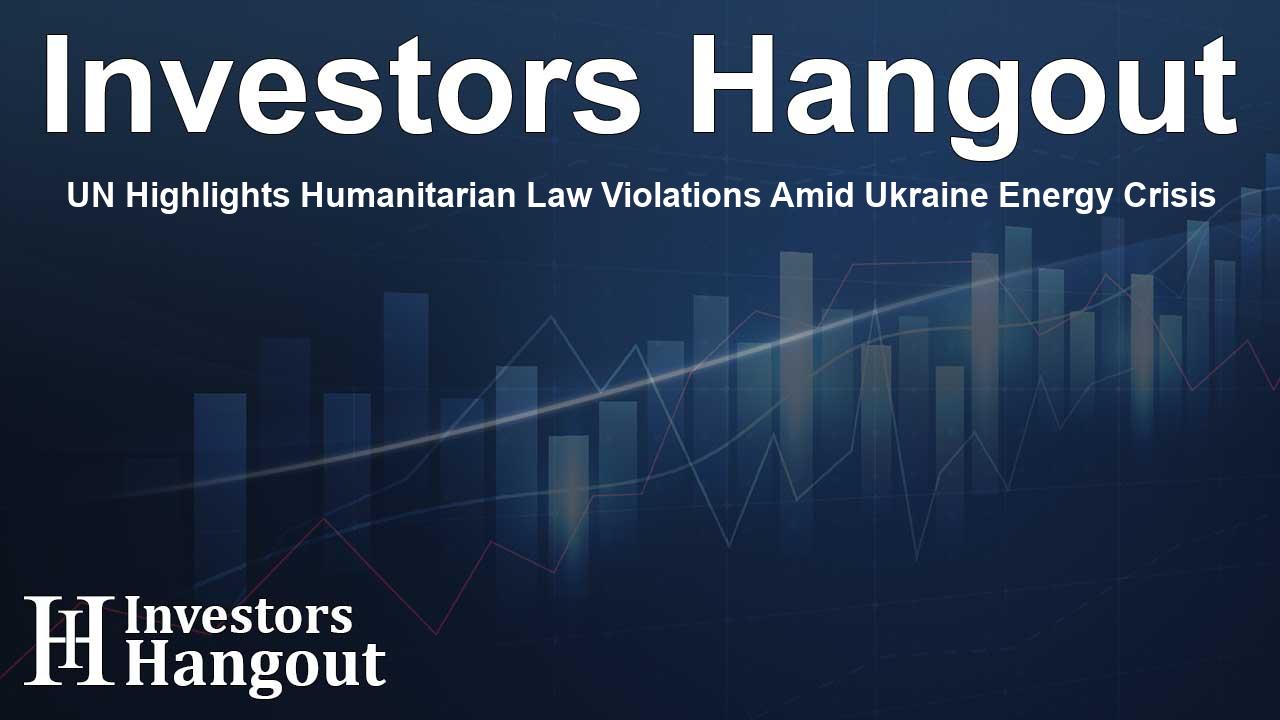UN Highlights Humanitarian Law Violations Amid Ukraine Energy Crisis

UN Reports Potential Violations of Humanitarian Law in Ukraine
By Max Hunder
As Ukraine braces for an extreme winter, the United Nations has issued serious warnings about Russia's air strikes targeting the country’s energy grid. These attacks likely infringe on international humanitarian law, according to a U.N. monitoring body, raising alarms about the struggles that the Ukrainian people may face in the coming months.
The conflict has seen a relentless barrage of missile and drone assaults aimed at Ukraine's electricity infrastructure. Since the onset of the invasion, Russia has deployed hundreds of such attacks against Ukrainian energy generation, transmission, and distribution facilities.
Initially, these significant strikes commenced during the autumn and winter of the previous year, just months after Russia escalated its military aggression. However, these assaults have intensified markedly since spring, complicating efforts to maintain essential energy services across the war-torn nation.
Each round of attacks has resulted in prolonged power outages, leaving major cities without electricity for extended periods—a situation that could deteriorate further as colder temperatures approach.
Insights from the Human Rights Monitoring Mission
The U.N. Human Rights Monitoring Mission in Ukraine (HRMMU) has meticulously examined nine distinct waves of strikes that occurred between March and August of this year. Their findings underscore a worrying trend.
According to the report, there is considerable evidence suggesting that the military strategy employed to damage or incapacitate civilian energy infrastructure fails to adhere to key principles of international humanitarian law.
The HRMMU’s investigation included visits to seven power plants that suffered damage or destruction from the attacks, alongside assessments of 28 communities that have been affected. These efforts reflect a broader commitment to understanding the full impact of these strikes on civilian life.
Claims of War Crimes and International Response
Ukrainian officials have labeled these targeted assaults on energy systems as war crimes. In response to the ongoing violence, the International Criminal Court has taken action by issuing arrest warrants for several Russian military officers implicated in these attacks against civilian infrastructures.
On the other hand, Moscow maintains that such power infrastructure is a legitimate target in this military conflict and dismisses the accusations against its military leaders as unfounded and irrelevant.
Risks to Civilian Life and Urban Infrastructure
The HRMMU report has highlighted the multifaceted risks that these air strikes pose, not only to the immediate energy supply but also to water systems, sanitation, and essential heating services across Ukraine. The impact is far-reaching, affecting public health, education, and the overall economy.
An alarming consideration is the situation in urban areas, where a majority of homes rely on centralized heating and hot water systems. This is particularly pronounced in cities like Kyiv, where nearly 95% of residents depend on centralized basement heating systems. The functioning of these systems is contingent upon electric pumps to deliver heat to upper levels of buildings.
The U.N. report warns that without a backup electricity supply, millions of urban dwellers could face life-threatening cold this winter. Experts have projected that Ukrainians might experience power outages lasting anywhere from four to eighteen hours each day throughout the winter months.
Continued Exodus of Ukrainians Amid the Crisis
The summer of 2024 saw a significant trend: energy-related issues emerged as the second most cited reason for individuals fleeing Ukraine. This trend reflects the wider humanitarian crisis and the urgent need for effective solutions to safeguard the lives of those impacted by the ongoing conflict.
Frequently Asked Questions
What are the main findings of the U.N. report regarding Russia's attacks?
The U.N. report indicates that Russia's air strikes on Ukraine's energy grid likely violate international humanitarian law, posing significant risks to civilians.
How have the attacks affected Ukrainian cities?
Ukrainian cities have experienced prolonged power outages lasting for hours at a time across all affected areas, critically impacting daily life.
What actions have been taken against those responsible for the attacks?
Arrest warrants have been issued by the International Criminal Court for several Russian officials involved in the bombing of Ukraine's civilian power infrastructure.
What challenges do urban residents face during winter?
Urban residents may be left without heat due to reliance on centralized heating systems, which are dependent on electric power for operation.
Why are energy-related issues a common reason for fleeing Ukraine?
Energy-related problems emerged as a prominent factor in the decision of many Ukrainians to leave their country amidst the ongoing crisis.
About Investors Hangout
Investors Hangout is a leading online stock forum for financial discussion and learning, offering a wide range of free tools and resources. It draws in traders of all levels, who exchange market knowledge, investigate trading tactics, and keep an eye on industry developments in real time. Featuring financial articles, stock message boards, quotes, charts, company profiles, and live news updates. Through cooperative learning and a wealth of informational resources, it helps users from novices creating their first portfolios to experts honing their techniques. Join Investors Hangout today: https://investorshangout.com/
Disclaimer: The content of this article is solely for general informational purposes only; it does not represent legal, financial, or investment advice. Investors Hangout does not offer financial advice; the author is not a licensed financial advisor. Consult a qualified advisor before making any financial or investment decisions based on this article. The author's interpretation of publicly available data shapes the opinions presented here; as a result, they should not be taken as advice to purchase, sell, or hold any securities mentioned or any other investments. The author does not guarantee the accuracy, completeness, or timeliness of any material, providing it "as is." Information and market conditions may change; past performance is not indicative of future outcomes. If any of the material offered here is inaccurate, please contact us for corrections.